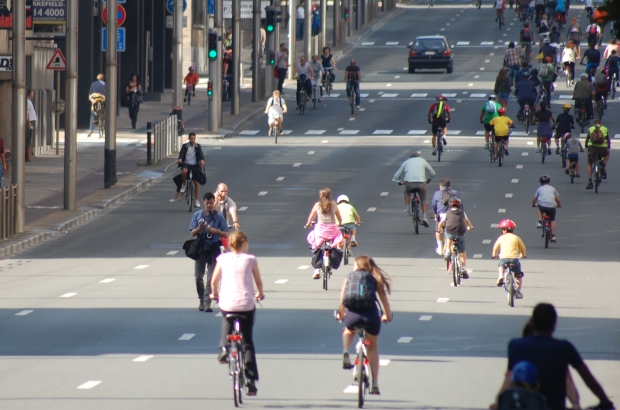- Daily & Weekly newsletters
- Buy & download The Bulletin
- Comment on our articles
Belgian cycling economy worth almost €1 billion a year
As Brussels residents got on their bikes this weekend for the annual Car-Free Sunday, a new study by Belgian research consultancy Transport & Mobility Leuven (TML) has revealed that the Belgian cycling economy is worth almost €1 billion.
The study commissioned by Belgium’s federal mobility ministry and using a number of research techniques such as a literature survey and interviews, assessed all the economic activities involving two-wheelers in terms of employment and net added value, as well as their growth potential.
The first finding was the variety of sectors involved. In addition to the production and sale of bicycles, cycling is important for the tourism and insurance industries, for example.
In 2022, the bicycle economy created a net added value of €951 million, an increase of 90% over the last eight years. The sector employed the equivalent of 17,400 full-time equivalent posts (FTEs), compared with less than 10,000 in 2019.
And from 2020 onwards, the Covid-19 crisis provided a clear boost to the two-wheeler sector, said TML, a private consultancy founded by KU Leuven university.
Cycle tourism, cycle infrastructure and the sale of bicycles and spare parts are recording the highest added value, TML said.
Bicycle leasing and rental have seen “spectacular growth” in recent years, it added. The net added value of this sector alone amounted to €101 million and has increased substantially between 2015 and 2022, while the number of full-time equivalents in the leasing and rental sector has risen by 241% to 189.
In terms of jobs, the cycle logistics (for example delivery) sector is in first place. It covers more than 7,000 FTEs, including the large number of bicycle couriers on platforms such as Uber Eats, Deliveroo and Takeaway.
TML said it carried out this study to show the growing economic importance of cycling to society and how much it benefits the public purse.
Cycling is becoming increasingly popular in Belgium – not only as a sport, but also as a means of mobility. More bicycles are being sold, especially electric ones.
There is also a growing popularity of new types of bikes such as gravel bikes (a lighter type of mountain bike), e-cargo bikes and e-sport bikes. Bike leasing is also on the rise, both among companies and individuals.
The rapidly growing bicycle sector is also generating myriad successful related activities, such as a range of shared bicycles, bicycle tourism, freight transport by bicycle, the development of bicycle tools and accessories, events and insurance. TML wanted to measure the impact of this on the economy.
For over a decade, TML has carried out studies that “objectively substantiate the social added value of cycling and indicate how policymakers can concretely shape their cycling policies,” the consultancy said, through projects not only throughout Flanders, Brussels, Wallonia, but also in Europe.
TML said it conducted this entire study on the cycling economy from the literature review and data collection and analysis to the market analysis and consumer and employee analysis.
“To do so, we consulted several databases, synthesised diverse data sources, and organised a large number of interviews with stakeholders and experts,” it added.



















